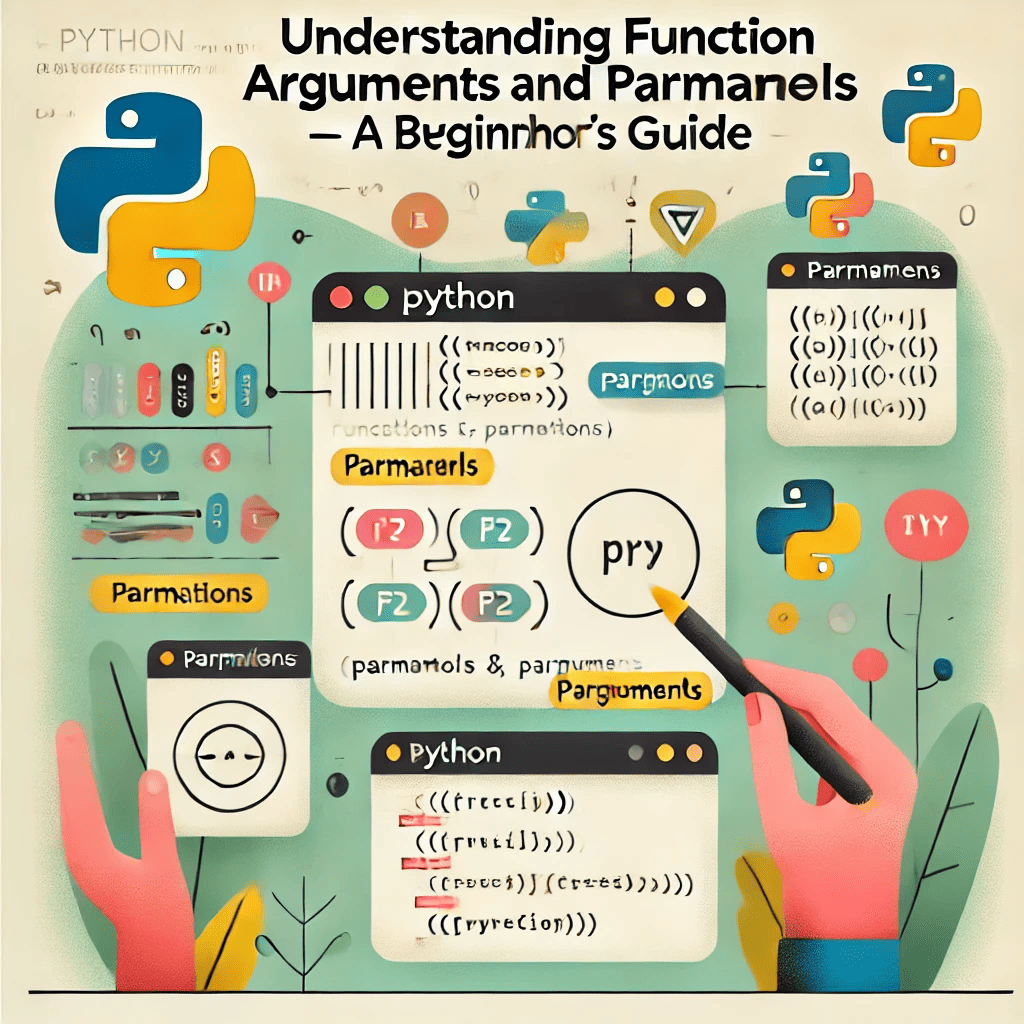Function Arguments and Parameters in Python
1. Introduction
In Python, function arguments and parameters are essential concepts that allow functions to accept data and perform tasks with different inputs. Whether you are passing values to a function or defining how a function should accept them, understanding how to use arguments and parameters is crucial for effective Python programming. In this guide, we will explain the differences between arguments and parameters, show how to use them, and provide real-life examples.

Focus Keyphrase: Function Arguments and Parameters in Python
2. What Are Function Arguments and Parameters?
a) Parameters
Parameters are variables defined in the function signature (the function definition) that specify what kind of data the function expects. They act as placeholders for the values you will pass into the function when you call it.
b) Arguments
Arguments are the actual values you pass into the function when you call it. These values replace the parameters in the function and are used within the function’s code.
Example:
def greet(name): # 'name' is the parameter
print(f"Hello, {name}!") # Prints the argument passed to the function
greet("Alice") # "Alice" is the argument
Output:
Hello, Alice!
3. Types of Function Arguments
a) Positional Arguments
Positional arguments are the most common type of arguments. They must be passed in the correct order that the parameters are defined in the function.
def add(a, b):
return a + b
result = add(3, 5) # 3 is passed to 'a', and 5 is passed to 'b'
print(result)
Output:
8
b) Keyword Arguments
Keyword arguments allow you to pass arguments by specifying the parameter name. This makes the function call more readable and avoids errors due to incorrect ordering.
def greet(name, age):
print(f"Hello, {name}! You are {age} years old.")
greet(age=30, name="Bob") # Arguments are passed by keyword
Output:
Hello, Bob! You are 30 years old.
c) Default Arguments
You can specify default values for parameters. These default values are used if no argument is passed for that parameter when the function is called.
def greet(name, greeting="Hello"):
print(f"{greeting}, {name}!")
greet("Alice") # Uses default greeting
greet("Bob", "Good morning") # Overrides the default greeting
Output:
Hello, Alice!
Good morning, Bob!
d) Variable-Length Arguments (*args and **kwargs)
You can pass a variable number of arguments to a function. This is useful when you don’t know in advance how many arguments will be passed.
*argsallows you to pass a variable number of positional arguments.**kwargsallows you to pass a variable number of keyword arguments.
def add_numbers(*args):
return sum(args)
result = add_numbers(1, 2, 3, 4, 5)
print(result)
Output:
15
def display_info(**kwargs):
for key, value in kwargs.items():
print(f"{key}: {value}")
display_info(name="Alice", age=30)
Output:
name: Alice
age: 30
4. Real-Life Applications of Function Arguments and Parameters
a) Calculating the Total Price of Items
In an e-commerce website, we might want to calculate the total price of items with different prices and quantities. We can pass prices and quantities as arguments to a function.
def calculate_total(price, quantity, discount=0):
return price * quantity - discount
total_price = calculate_total(100, 2, discount=20)
print(f"Total price: ${total_price}")
Output:
Total price: $180
b) Personalized Greeting Message
Functions with parameters can be used to send personalized messages.
def personalized_greeting(name, greeting="Hello"):
print(f"{greeting}, {name}! Welcome to our platform.")
personalized_greeting("Eve")
personalized_greeting("Jack", "Good afternoon")
Output:
Hello, Eve! Welcome to our platform.
Good afternoon, Jack! Welcome to our platform.
5. Common Mistakes and How to Fix Them
Mistake 1: Passing the Wrong Number of Arguments
❌ Incorrect:
def greet(name, age):
print(f"Hello, {name}! You are {age} years old.")
greet("Alice") # Missing the second argument
✅ Fix: Ensure you pass the correct number of arguments.
greet("Alice", 25) # Pass both 'name' and 'age'
Mistake 2: Confusing Positional and Keyword Arguments
❌ Incorrect:
def add(a, b):
return a + b
add(3, b=5) # Mixing positional and keyword arguments
✅ Fix: Always use keyword arguments after positional ones.
add(a=3, b=5) # Use keyword arguments
Mistake 3: Using Default Arguments Incorrectly
❌ Incorrect:
def greet(name, greeting="Hello"):
print(f"{greeting}, {name}!")
greet() # Missing the required 'name' argument
✅ Fix: Ensure required arguments are passed.
greet("Alice") # Pass the required argument
6. Conclusion
Function arguments and parameters are essential for making your functions flexible and reusable in Python. By understanding how to define and use them, you can create more efficient and readable code. Experiment with different argument types and incorporate them into your Python programs to handle more complex tasks.
Next Steps:
- Practice defining functions with different types of arguments.
- Use
*argsand**kwargsto handle variable-length arguments. - Explore more real-world applications using functions and arguments.
